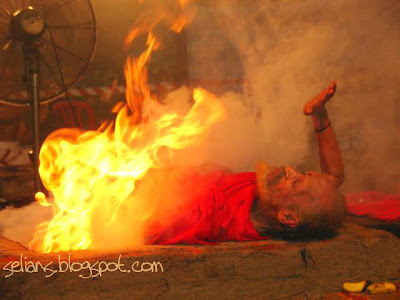Peaceful Assembly Bill comes under UN fire
A
group of UN human rights experts has warned that the Peaceful Assembly
Bill not only restricts the right to peaceful assembly, including street
protests, but also conditional access for media to public gatherings.
UN Special Rapporteur Maina Kiai voiced “deep regret” that the Human Rights Commission of Malaysia (Suhakam) or civil society was not meaningfully consulted in the drafting of the bill.
 In a statement released by the group, Maina (right)
said the bill contains a vague definition of assembly and also places
broad restrictions and conditions on gatherings, which he described as
giving “excessive authority” and power to law enforcement officials and
the home minister.
In a statement released by the group, Maina (right)
said the bill contains a vague definition of assembly and also places
broad restrictions and conditions on gatherings, which he described as
giving “excessive authority” and power to law enforcement officials and
the home minister.
“Many of these restrictions are not justifiable under international law. It also gives discretion to the police to make any form of recording of assemblies,” said Maina who is the UN Special Rapporteur on the rights to freedom of peaceful assembly and of association.
The bill was tabled for its first reading by Minister in the Prime Minister's Department on Nov 21 and it was passed hastily with some amendments less than a fortnight ago, on Nov 29.
 The bill was passed amidst a walkout by the opposition MPs after debating the bill, and also a protest by more than 1,000 lawyers on the same day.
The bill was passed amidst a walkout by the opposition MPs after debating the bill, and also a protest by more than 1,000 lawyers on the same day.
The bill also includes a prohibition on non-citizens and citizens under the age of 21 to assemble peacefully.
Malaysia is a member of the UN Human Rights Council until 2013.
Alarmed by restrictions
 Another Special Rapporteur, Margaret Sekaggya (left), said she is alarmed by the provision prohibiting citizens below 21 years of age to assemble.
Another Special Rapporteur, Margaret Sekaggya (left), said she is alarmed by the provision prohibiting citizens below 21 years of age to assemble.
“Political and social participation through peaceful protests are not only an educational experience for children, youth and students but also an investment for society as a whole,” she exclaimed.
Frank La Rue, another Special Rapporteur on the right to freedom of expression, has urged the Malaysian government to seriously reconsider the adoption of the bill.
“The ability of all individuals to express themselves freely, including in the form of peaceful assemblies, is a litmus test for the level of democracy in any country.”
 Fracois Crepeau (left), a Special Rapporteur on the human rights of migrants called for an urgent review of the bill.
Fracois Crepeau (left), a Special Rapporteur on the human rights of migrants called for an urgent review of the bill.
“Everyone has the right to freedom of assembly and association, without distinction of any kind, including nationality,” said Crepeau.
All the cited experts report to the UN Human Rights Council, Geneva, in an independent and unpaid capacity.
Last July, the office of the UN High Commissioner for Human Rights voiced concern over the apparent use of excessive force against protesters on the July 9 Bersih 2.0 rally.
UN Special Rapporteur Maina Kiai voiced “deep regret” that the Human Rights Commission of Malaysia (Suhakam) or civil society was not meaningfully consulted in the drafting of the bill.
“Many of these restrictions are not justifiable under international law. It also gives discretion to the police to make any form of recording of assemblies,” said Maina who is the UN Special Rapporteur on the rights to freedom of peaceful assembly and of association.
The bill was tabled for its first reading by Minister in the Prime Minister's Department on Nov 21 and it was passed hastily with some amendments less than a fortnight ago, on Nov 29.
The bill also includes a prohibition on non-citizens and citizens under the age of 21 to assemble peacefully.
Malaysia is a member of the UN Human Rights Council until 2013.
Alarmed by restrictions
“Political and social participation through peaceful protests are not only an educational experience for children, youth and students but also an investment for society as a whole,” she exclaimed.
Frank La Rue, another Special Rapporteur on the right to freedom of expression, has urged the Malaysian government to seriously reconsider the adoption of the bill.
“The ability of all individuals to express themselves freely, including in the form of peaceful assemblies, is a litmus test for the level of democracy in any country.”
“Everyone has the right to freedom of assembly and association, without distinction of any kind, including nationality,” said Crepeau.
All the cited experts report to the UN Human Rights Council, Geneva, in an independent and unpaid capacity.
Last July, the office of the UN High Commissioner for Human Rights voiced concern over the apparent use of excessive force against protesters on the July 9 Bersih 2.0 rally.

Comments